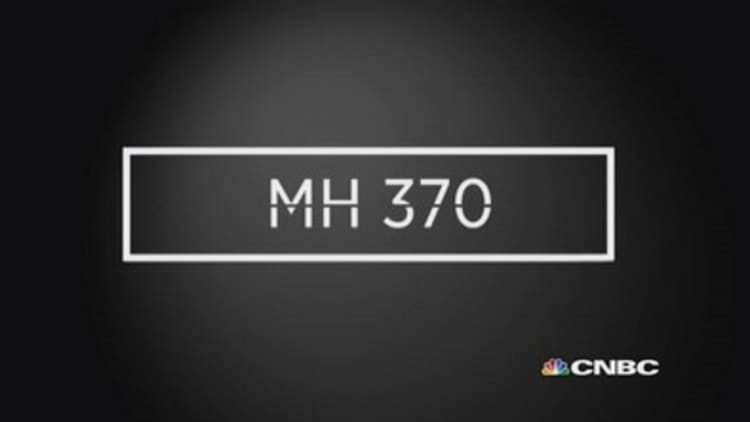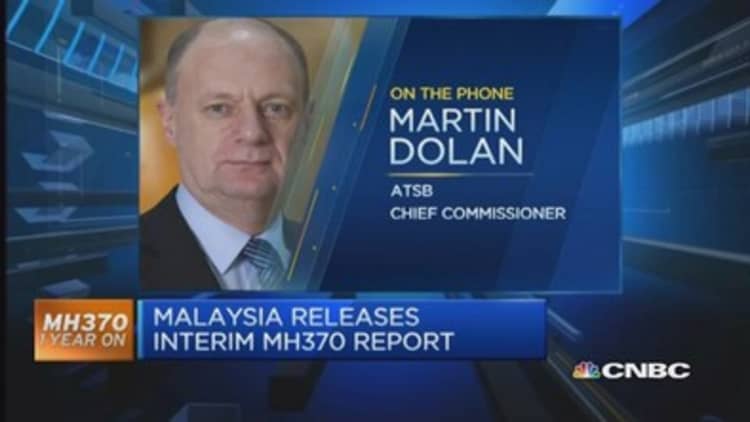The battery on one of Malaysian Airline flight MH370's data recorder beacons may have expired more than a year before the plane went missing, according to the nearly 600-page interim safety-investigation report released by Malaysia's transport ministry Sunday.
"According to maintenance records, the SSFDR ULB (solid state flight data recorder underwater locater beacon) battery expired in December 2012. There is no evidence to suggest that the SSFDR ULB battery had been replaced before the expiry date," the report said.
"While there is a definite possibility that a ULB, will operate past the expiry date on the device, it is not guaranteed that it will work or that it would meet the 30-day minimum requirement," it said. "There is also limited assurance that the nature of the signal (characteristics such as frequency and power) will remain within specification," the report said.
Read More Malaysia Airlines: One year after MH370
The commercial plane operated by Malaysia's flagship carrier vanished during a routine flight from Kuala Lumpur to Beijing on March 8, 2014; debris has yet to be found. What caused the plane to disappear remains a topic of speculation and has become one of the aviation world's biggest mysteries to date.
Investigation of various radar and tracking data indicate it flew far off course before disappearing into the Indian Ocean.
The captain ordered enough fuel for seven hours and 31 minutes of flight, compared with a planned flight duration of 5 hours and 34 minutes, the report said.
Searchers had initially focused on trying to detect "pings" from the beacons on the flight recorders, known as black boxes.

The interim report attributed the maintenance lapse on replacing the battery to a failure to correctly update the computer system used to track and call out maintenance issues.
"This oversight was not noted until after the disappearance of MH370 when details of the ULBs were requested," the report said. "Subsequently, MAS Engineering Technical records carried out a fleet-wide record inspection for the ULBs to ensure all records for other aircraft are updated accordingly."
The battery on the SSCVR, or solid state cockpit voice recorder, underwater beacon was replaced before its expiry date, as scheduled, the report said.
In the wake of the missing flight, Malaysia has set plans to upgrade its civilian radar systems and improve its ability to track flights, according to a recent Wall Street Journal report.
Read More To explain missing Malaysia Airlines flight, 'Rogue pilot' seems likeliest theory
Accusations were leveled at MAS for its mismanagement of the MH370 search effort and dealings with families of the 239 passengers on board flight MH370. The incident also raised questions globally about the inability to track the whereabouts of individual jets and plans have been agreed in principle to have planes automatically report their positions around every 15 minutes.
Among other details in the latest report, the investigation found little reason for concern about the captain and crew.
None of the flight or cabin crew had major disciplinary records, with some minor, "cautionary administrative letters" issued to some cabin crew, the report said.
It noted the finances, including income and expenses, of Captain Zaharie Ahmad Shah appeared normal and that he didn't appear to have a life insurance policy.
"The Captain's ability to handle stress at work and home was good. There was no known history of apathy, anxiety, or irritability. There were no significant changes in his life style, interpersonal conflict or family stresses," the report said.

While the first officer, Fariq Abdul Hamid, didn't have much in the way of savings in his bank account, his finances also didn't appear unusual, the report said. The first officer had a life insurance policy.
It cited "no evidence of recent or imminent significant financial transactions carried out" for either the first officer or the cabin crew.
Investigators examined CCTV recordings at the Kuala Lumpur International Airport of the captain and first officer on the day of the missing flight's departure as well as on three previous occasions and found no significant behavioral changes, the report said.
"On all the CCTV recordings the appearance [of the captain] was similar, i.e. well groomed and attired. The gait, posture, facial expressions and mannerism were his normal characteristics," it said.
"There were no behavioral signs of social isolation, change in habits or interest, self-neglect, drug or alcohol abuse of the captain, first officer and the cabin crew," the report said.
Earlier on Sunday, Malaysia's Prime Minister Najib Razak said the country is committed to continuing the search for the missing plane, according to a Reuters report. The comment followed reports that Australia, which has been leading the search in the Indian Ocean, was considering ending the operation.
--Nyshka Chandran contributed to this article.


